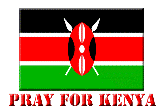The deal is not yet done until it is implemented. We will soon be getting into the untested waters of governance and the big question is; how prepared are we to navigate through the turbulent waters and avoid hitting jagged rocks that we might encounter?
The MPs agreed to fast track the deal through the procedures of Parliament and ensure it is enacted into law. This is expected to be followed by a rollout of a broad reform agenda to address challenges of governance.
They then have to try to "sell" the idea of power sharing to their constituents, among them people who are now homeless or who have lost loved ones in the violence.
There are still potential stumbling blocks ahead - in particular, how power will be shared and how cabinet posts and other senior positions will be allocated.
But for Thursday's ceremony the tone was conciliatory and upbeat.
This country is emerging from one of the darkest periods of its history and the coming weeks will be a real test of the commitment of all sides to a durable peace.
Some 1,500 people died in unrest after disputed poll resultsKenyans will be forced to confront some awkward realities with the establishment of a truth, justice and reconciliation commission to investigate past injustices and violence blamed on supporters on all sides of the political fence.
They will also be forced to compromise.
There are concerns that a grand coalition will rob Kenyans of a real opposition.
Raila is charismatic, but ambitious; will he manage to keep his men together? If he does; political, constitutional and physical development will take place. It is certainly in his interest to do so, since he is now well poised to be the next president. But if ODM leaders squabble and split up, PNU will capitalise on this, and the equitable development Kenya badly needs will not happen, and the situation will be back to square one.
How will the power-sharing work in practice?
Will both teams be ready to give way, as they did to enable the present agreement be signed, or will they play an endless game of power-jostling, legal quibbling and name-calling?
Kenyans have been sobered, even frightened at what happened. No-one wants a replay of events, except perhaps a few greedy people ready to benefit from any tragedy. It is the moment to make a fresh start, and re-assess one's stance, with regard to ethnicity, the wealth-poverty gap, and governance.
Many eyes were on Kenya last December, hoping that if Kibaki were defeated he would step down like a gentleman, but the waters were muddied. This is the chance for them to be cleansed. If the two leaders make this coalition work, it could set an interesting precedent for a continent, artificially divided along ethnic lines where power and tribe are inter-locked.
Kibaki is the old-style leader, surrounded by like-minded advisers, for whom power means wealth and the aloofness of top-down rule. Raila, however, is comfortable anywhere and with anyone, in a popular bar or soccer match, dressed in a Nigerian outfit, and with the younger generation. The two men are poles apart, in style, beliefs and approach, but united in their wish to govern Kenya. Govern Kenya together, or as individuals? Can this partnership work? This is the question on Kenyans' lips.
The political settlement, the third item on the mediation agenda, has been solved - on paper. It is everyone's hope and prayer it will work. The first item, stopping the violence, depended on this, and still depends on this. Militias, organised and armed, were ready to enter action at a signal, if these talks had failed, and the violence would have been as bloody as before. Will these be disbanded and disarmed, or are they waiting on standby?
The second item, however, the humanitarian crisis still needs to be addressed, and urgently. The thousands displaced within Nairobi itself do not have homes to go to; they were destroyed.
Hundreds of women walk long distances everyday to collect foodstuffs from church compounds; the food-stalls were destroyed in the violence.
In the camps, within Nairobi and outside, toilet facilities are rudimentary and filthy; people queue hours for the food. The Red Cross and other NGOs are doing good work, but need more support.
Yet many Kenyans have reacted heroically and generously; some have sheltered neighbours of different ethnic groups, risking their lives.
The leader of a mainly Luo youth group from Kibera told me they had been taking food to Kikuyu refugees camped in a public park.
Related articles: Kenya media didn't incite violence-report
Mikumi National Park Tickets
-
Mikumi National Park Tickets If you are interested in buying tours or
tickets to Mikumi National Park, browse a range of those here. READ ALSO:
The Best Ti...
21 hours ago





1 comment:
The RSF report was poor: there's no serious examination of the role of vernacular stations in fanning the violence before the vote; there's no serious examination of the pros and cons of reportage in the immediate aftermath; there's insufficient appreciation of the restraint shown by the mainstream media.
Post a Comment